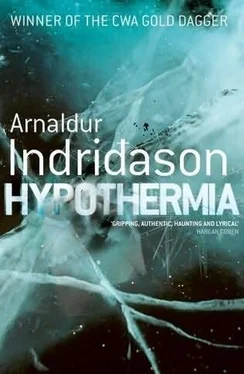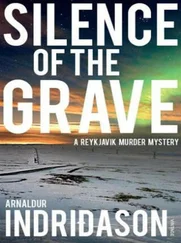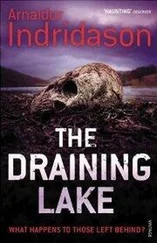‘Be careful!… You don’t know what you’re doing!’
Erlendur was startled by the anger in the voice. But in the next breath it had changed.
‘Was that all right?’ the medium asked.
‘I think so,’ said the high-voiced woman. ‘What was…?’
She hesitated.
‘Did anyone you recognise make contact?’ the medium asked.
‘Yes.’
‘Good, I… Why am I so cold…? My teeth are chattering.’
‘There was a different voice…’
‘Different?’
‘Yes, not yours.’
‘What did it say?’
‘It said I should be careful.’
‘I don’t know what it was,’ the medium said. ‘I don’t remember any-’
‘It reminded me…’
‘Yes?’
‘It reminded me of my father.’
‘The cold… doesn’t come from there. The intense cold that I’m feeling. It’s directly connected to you. There’s something dangerous about it. Something you should beware of.’
Erlendur reached out and turned off the tape. He couldn’t face listening to any more. It felt disrespectful. The recording contained material that touched his conscience. He felt as if he were listening at a door. He couldn’t bear to dishonour the woman’s memory by eavesdropping any further.
The old man was waiting for Erlendur at the front desk. He used to come to the police station with his wife but now that she had passed away he came to see Erlendur alone. The couple had dropped by his office regularly for nearly thirty years now, first every week, then every month, then several times a year, then once a year and finally at two- to three-yearly intervals on their son’s birthday. Over the years Erlendur had become well acquainted with them and with the sorrow that drove them to seek him out. Their younger son, Davíd, had walked out of their house in 1976 and had never been heard from again.
Erlendur shook the old man’s hand and showed him to his office. On the way he asked him how he was doing. The old man said he had moved into a nursing home some time ago but was not happy there. ‘It’s full of nothing but old people,’ he said. He had come down to the station by taxi and asked if Erlendur could call a car to pick him up when their meeting was over.
‘I’ll get someone to give you a lift home,’ Erlendur said, opening the door of his office for him. ‘So the nursing home’s not very lively, then?’
‘Not very, no,’ the old man said as he took a seat.
He had come to enquire after news of his son, although he knew, and had long known, that no news would be forthcoming. Erlendur understood this extraordinary persistence and had always received the couple civilly and shown them the consideration of listening to them. He knew that they had always followed the news – read the papers, listened to the radio and watched the television – in the faint hope that someone had somewhere found a clue relating to their son’s disappearance. But in all these years there had not been a single lead.
‘He would have been forty-nine today,’ the old man said. ‘The last birthday he celebrated was his twentieth. He invited all his college friends over, and Gunnthórunn and I had to leave the house for the duration. The party went on till the early hours. He never got to celebrate his twenty-first.’
Erlendur nodded. The police had never found any clues relating to their son’s disappearance. It had been reported thirty-six hours after Davíd had left home. He sometimes studied at a friend’s house till late at night and went in to school with him in the morning, and had mentioned to his parents that he was going round to see him that evening and might stay over. They were revising for their final exams and were due to finish sixth-form college that spring. He had also mentioned that he needed to go to a bookshop. When he didn’t come home from school the following day, his parents began to ring around and ask after him. It transpired that he had not turned up to classes that morning. They called his friend who said that Davíd had not visited him, nor had he mentioned his plans for that evening. The friend had asked Davíd if he felt like going to the cinema, but Davíd had said that he had other fish to fry, without stating what. Other friends and acquaintances proved ignorant of Davíd’s whereabouts. He had been lightly dressed when he had left home.
Notices were placed in the papers and appeals were made on television but to no avail and as time wore on his parents’ and brother’s hopes faded. They refused point-blank to listen to any suggestion of suicide, adamant that the very idea would have been alien to Davíd. But after weeks and months had elapsed with no explanation of Davíd’s disappearance, Erlendur said that they should not rule it out. He himself could not see many other possibilities in this case, given that the young man had not been planning to go climbing or to travel into the interior. Another possible explanation was that he had accidentally fallen foul of someone in the criminal fraternity who had disposed of him, for reasons that were obscure, and had hidden the body. His parents and friends had flatly denied that he’d had a quarrel with anyone or could have been involved in any criminal activity that might explain his disappearance. Police checks confirmed that he had not left the country by plane, nor was his name present on the passenger lists of any ships. And no staff at any of the country’s bookshops had noticed him in their stores on the day he had vanished.
The old man took a mug from Erlendur and slurped his coffee noisily, though it was not particularly hot. Erlendur had attended his wife’s funeral. They did not seem to have many friends or a large family. Their other son was divorced and had no children. A small women’s choir had stood at the organ, singing: ‘Hark, Heavenly Creator…’
‘Is there any news of our case?’ the old man asked, having half-emptied his cup. ‘Has anything new emerged?’
‘No, I’m afraid not,’ Erlendur said, for the umpteenth time. He did not find the old man’s visits a trial. For him, the worst part was that there was little he could do for him except listen to his repeated protestations of what a dreadful thing it was about their dear boy and how could something like that happen and how could there be no news of him?
‘Of course, the police have enough on their plates,’ the old man said.
‘It comes in waves,’ Erlendur said.
‘Yes, well, no, anyway, best be making tracks,’ the old man said, without moving, as if there were something more to be said. Yet they had gone over everything that mattered.
‘I’ll be in touch if anything comes up,’ Erlendur promised, sensing the old man’s hesitation.
‘Yes… erm… the thing is, Erlendur, I may not be bothering you again,’ the old man said at last. ‘It’s probably time to let sleeping dogs lie. You see, they’ve found something…’ He coughed. ‘They’ve found some muck in my lungs. I’ve always smoked like an idiot and apparently it’s all coming home to roost, so I don’t know what… And all that cement dust can’t have helped, either. So I wanted to say goodbye, Erlendur, and to thank you for everything, everything you’ve done for us ever since you first came to see us that terrible day. We knew you would help us and you have done, although we’re no nearer. He’s dead, of course, and has been all these years. I think we’ve known that for a long time. But one… we… where there’s life there’s hope, isn’t there?’
The old man stood up. Erlendur rose too and opened the door.
‘There’s always hope,’ he agreed. ‘How do you feel with that stuff in your lungs?’
‘I’m an old crock these days, anyway,’ the old man said. ‘Worn out all the time. Utterly worn out. And since I was given the diagnosis, breathing seems to have become more of an effort too.’
Читать дальше












